Unit 3 Grammar教学课件--牛津译林版中学英语八年级下
文档属性
| 名称 | Unit 3 Grammar教学课件--牛津译林版中学英语八年级下 | 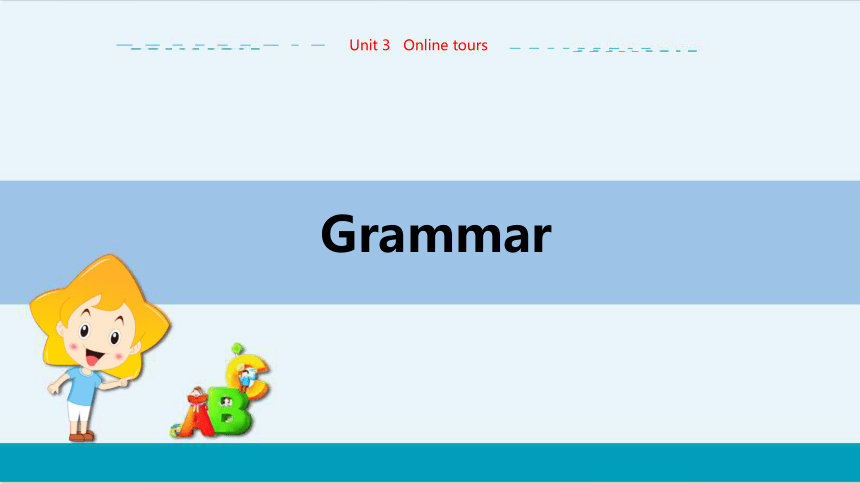 | |
| 格式 | pptx | ||
| 文件大小 | 2.1MB | ||
| 资源类型 | 试卷 | ||
| 版本资源 | 牛津译林版 | ||
| 科目 | 英语 | ||
| 更新时间 | 2024-02-21 19:40:54 | ||
图片预览


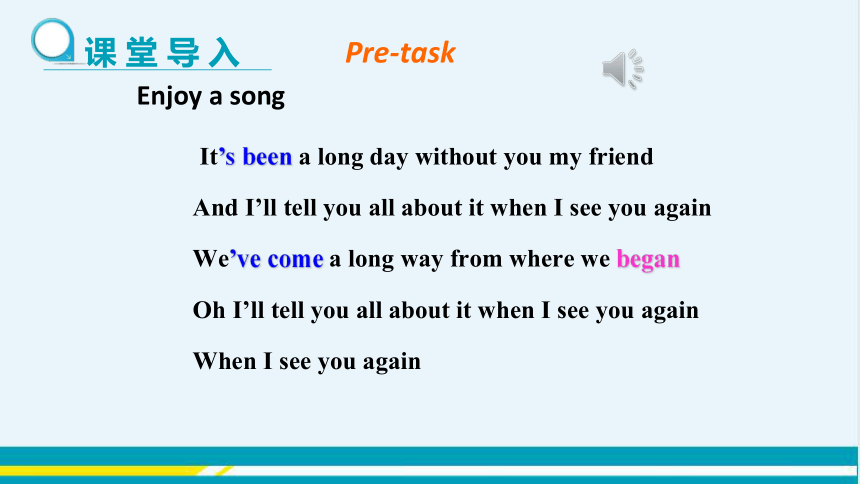
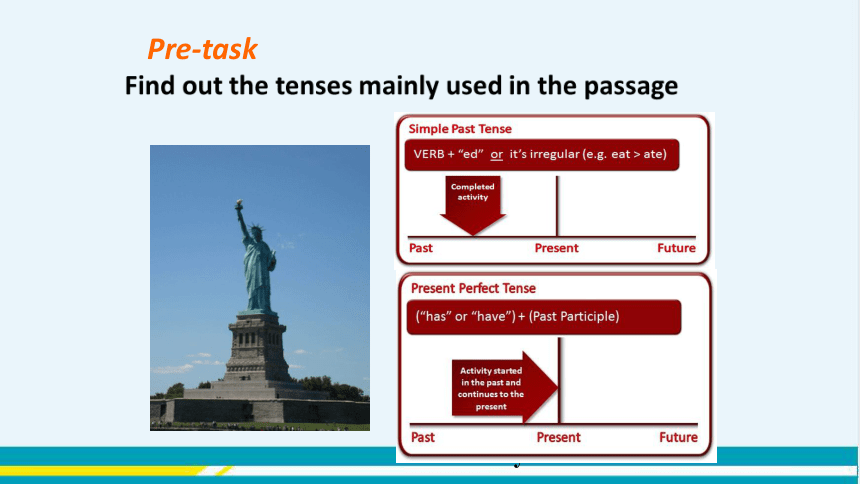
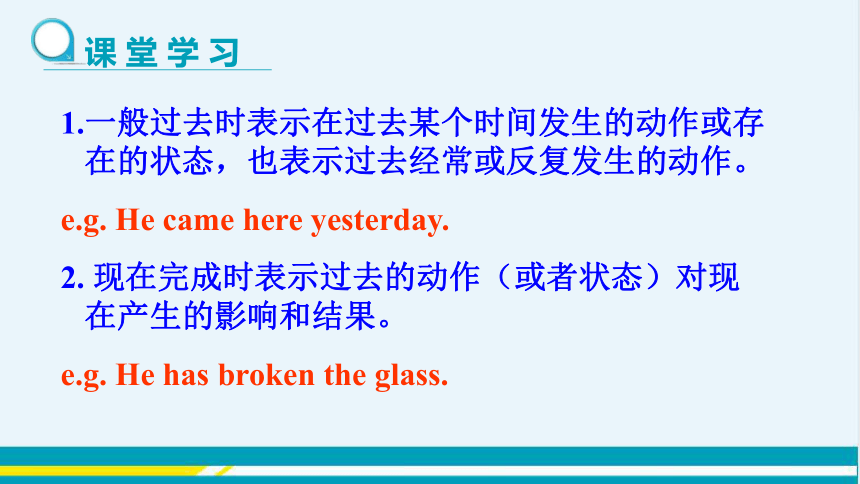
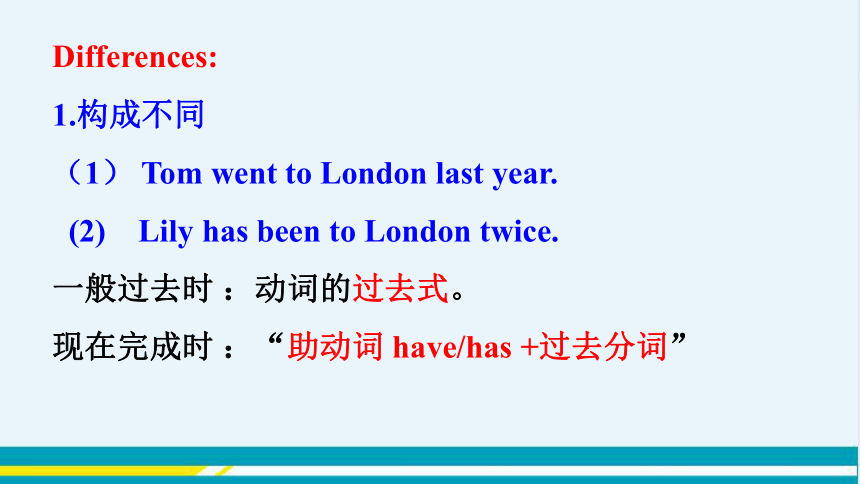
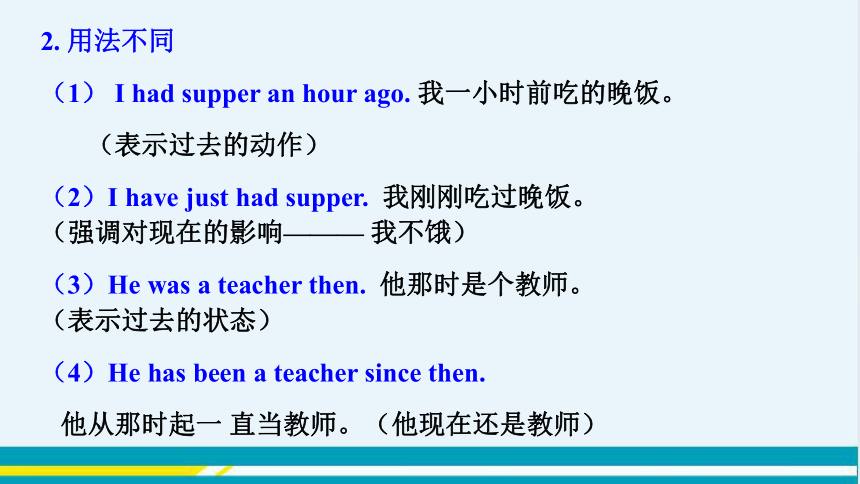
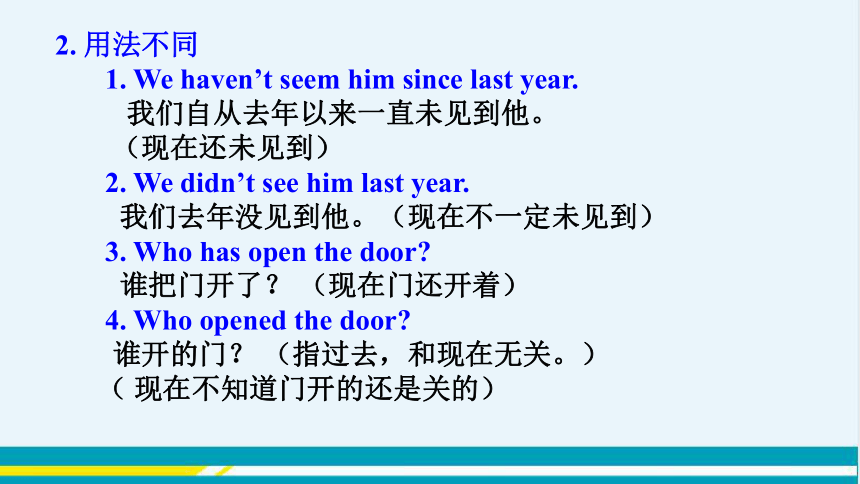
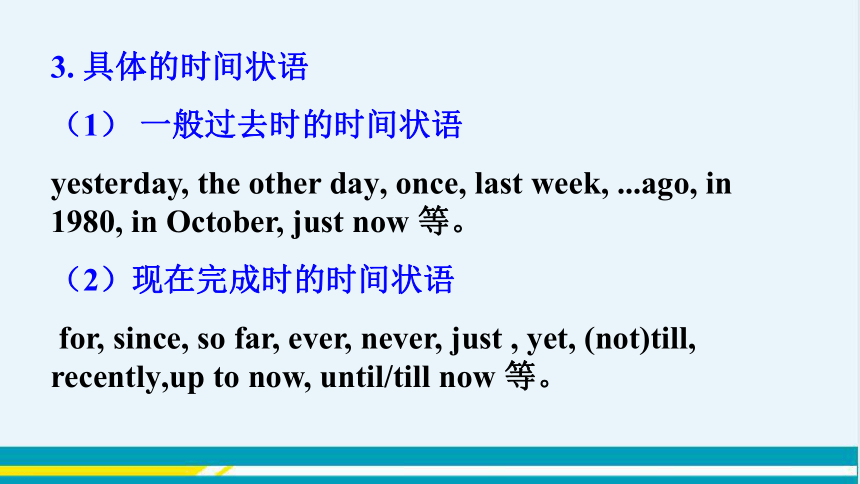



文档简介
(共40张PPT)
Grammar
Unit 3 Online tours
学 习 目 标
掌握本课时新单词及短语:dream, passport,online tour
1
3
能组织含有一般过去时和现在完成时的句子。
了解一般过去时和现在完成时的区别。
2
Pre-task
Enjoy a song
It’s been a long day without you my friend
And I’ll tell you all about it when I see you again
We’ve come a long way from where we began
Oh I’ll tell you all about it when I see you again
When I see you again
课 堂 导 入
Pre-task
Millie had a dream last night. She dreamt of travelling to the USA.
Millie has been to the USA once. She went there in 2017.She had a wonderful time there. Her uncle is in the USA. He has lived there for three years.
一般过去时表示在过去某个时间发生的动作或存在的状态,也表示过去经常或反复发生的动作。
e.g. He came here yesterday.
2. 现在完成时表示过去的动作(或者状态)对现在产生的影响和结果。
e.g. He has broken the glass.
课 堂 学 习
Differences:
构成不同
(1) Tom went to London last year.
(2) Lily has been to London twice.
一般过去时 :动词的过去式。
现在完成时 :“助动词 have/has +过去分词”
2. 用法不同
(1) I had supper an hour ago. 我一小时前吃的晚饭。
(表示过去的动作)
(2)I have just had supper. 我刚刚吃过晚饭。
(强调对现在的影响——— 我不饿)
(3)He was a teacher then. 他那时是个教师。
(表示过去的状态)
(4)He has been a teacher since then.
他从那时起一 直当教师。(他现在还是教师)
2. 用法不同
1. We haven’t seem him since last year.
我们自从去年以来一直未见到他。
(现在还未见到)
2. We didn’t see him last year.
我们去年没见到他。(现在不一定未见到)
3. Who has open the door
谁把门开了? (现在门还开着)
4. Who opened the door
谁开的门? (指过去,和现在无关。)
( 现在不知道门开的还是关的)
3. 具体的时间状语
(1) 一般过去时的时间状语
yesterday, the other day, once, last week, ...ago, in 1980, in October, just now 等。
(2)现在完成时的时间状语
for, since, so far, ever, never, just , yet, (not)till, recently,up to now, until/till now 等。
dream vi.& vt. 做梦,梦想
dream about/of 想象;梦想
Do you often dream at night
你在夜里经常做梦吗?
I sometimes dream about my parents.
我有时梦见我的父母。
I dream of becoming a teacher.
我一心想当个教师。
New words
passport n. 护照
Daniel 两年前去了北京。
Daniel went to Beijing two years ago.
Daniel 已经在北京居住两年了。
Daniel has lived in Beijing for two years.
We use simple past tense to tell what happened in the past.
We use the present perfect tense to talk about an action that started in the past and continues to the present.
Presentation
1. 三年前他养了只猫做宠物。
He ______ a cat as pet three years ago.
2. 这只宠物猫他养了三年了。
He _________ the pet cat for three years.
kept
has kept
Exercises
Daniel 上个月买了台新电脑。
Daniel bought a new computer last month.
Daniel已经买了台新电脑。
Daniel has bought a new computer.
(Daniel has a new computer now.)
We use the simple past tense to tell what happened in the past.
We use the present perfect tense to talk about the result of an action.When the action happened is not very important. It may have just happened or happened some time ago.
Presentation
1. 我上个星期去参观了那个新动物园。
I _______ that new zoo last week.
2. 我已经参观过那个新动物园了。
I ____________ that new zoo.
visited
have visited
Exercises
吴老师2010年和2011年访问过加拿大。
Mr Wu visited Canada in 2010 and 2011.
吴老师已经去过加拿大两次。
Mr Wu has been to Canada twice.
We use the simple past tense to tell what happened in the past.
We use the present perfect tense to tell how many times an action has happened till now.
Presentation
1. 我上周看过这部电影。
I _____ this movie last week.
2. 我已经看过这部电影很多次。
I __________ this movie many times.
saw
have seen
Exercises
Fill in the blanks:
Last Sunday, Ted and his father ______________ (be) at home. They ____________ (move) to a new house. His father _____________(want) to put the books in some boxes, but he _____________ (can not) find any boxes. Ted ____________ (tell) him the boxes _______________ (be) in the next room.
Then he ____________(bring) these
boxes to his father.
were
moved
wanted
told
couldn’t
were
brought
1. —Is Tom doing his homework
—No, he ______________ (finish) his homework.
2. —Do you know Miss King
—No, but I ______________ (hear of) her before.
3. —What about the film
— Sorry, I don’t know. I _______________ (not see) it yet.
4. —_____________ you ever ____________ (be) to the Great Wall
—No, never.
5. —Help yourself, please.
—No, thanks. I am full. I ______ just ____ (eat) three eggs.
has finished
have heard of
haven’t seen
Have
been
have
eaten
用所给词的适当形式填空
My friend Neil lives in the UK. He ______ (visit) the Palace Museum online the other day.
I ________ (see) many local arts on the website of the Hangzhou Arts and Crafts Museum last week.
visited
saw
A:Simon is talking with Millie about some online plete their sentences with the correct forms of the words in brackets.
_____ you ever _____ (try) the online games on the website of the Shannxi History Museum
I ___________________
(learn) a lot from Digital Dunhuang by now.
Have tried
have learnt/learned
1. I ________________ (finish/ just) my homework.
Millie ________ (finish) her homework 20 minutes ago.
2. I ______ (write) an email to my friend yesterday.
Daniel _________________ (write/ already) two emails.
has already written
have just finished
wrote
finished
B:Mr Wu is asking the students to make
sentences with the correct tenses. Help them complete the sentences with the correct forms of the words in brackets.
3. I ______(be) in Hainan last week.
Some of our classmates _____________ (not be) to Hainan yet.
4. I __________ (live) in Sunshine Town since I was born.
Daniel _____ (live) in Nanjing in 2007.
was
lived
have lived
haven not been
Millie: ___________________ (you/be/ever) to Nanjing
Simon: Yes. I(2)____________(be) there three times.
Millie: When (3)____________ (you/go) there last
Simon: Last summer. I (4)______(spend) a week there.
Millie: (5)____________ (you/like) it
Have you ever been
have been
did you go
spent
Do you like
C:Millie has never been to Nanjing. She is asking Simon about the city. Complete their conversation with the correct forms of the words in brackets.
Simon: Oh yes. I (6)_____ (have) a great time there. I (7)______ (visit) many places of interest and (8)____ (eat) lots of local food.
Millie: Lucky you! I (9)_______________
(be/never) there.
had
visited
ate
have never been
be buy read return see show
Saturday, 15 March
Have you ever dreamt of travelling around the world without a passport Yes, you can realize your dream by taking an online tour. Yesterday Danniel (1)_________ me an online tour of the USA. I (2)_____ never _____ so many wonderful pictures before.
showed
have seen
D:Millie is writing about the USA in her diary. Complete her diary entry with the correct forms of the verbs in the box.
Last week, I (3)_________ a book about the places of interest in the USA. I (4)_________ 20 pages already. It’s really interesting. My dad (5)_____ just _________ from the USA, but I (6) ______ never_______ there. I hope I can visit the USA some day.
be buy read return see show
have been
bought
have read
has
returned
Tips:
some day 和 the other day 的区别:
some day指将来“总有一天、有朝一日、终将、(日后)某一天”,句子用一般将来时。如:
Your wishes will come true some day.
总有一天你的愿望会实现的。
Some day you’ll have to pay for what you have done.
总有一天你要为你的行为而付出代价的。
the other day 相当于a few days ago, 意为“几天前、某天、那天、不久前”,句子用一般过去时。如:
I met her in the street the other day.
几天前我在街上碰见过她。
I bought the watch the other day.
这手表我是几天前买的。
1) 一般过去时表示过去某时发生的动作或单纯叙述过去的事情,强调动作;现在完成时强调过去的事情对现在的影响,强调的是影响。
Summary
2) 一般过去时常与具体的时间状语连用,而现在完成时通常与模糊的时间状语连用,或无时间状语。
一般过去时的时间状语:yesterday, last week, … ago, in 1980, in October, just now等,皆为具体的时间状语。
现在完成时的时间状语:for, since, so far, ever, never, just, yet, till/until, up to now, in past years等,皆不确定的时间状语。
共同的时间状语:this morning, tonight, this April, now, already, recently, lately 等。
3) 现在完成时可表示持续到现在的动作或状态,动词一般是延续性的,如:live, teach, learn, work, study, know。
一般过去时常用的非持续性动词(短语)有come, go, leave, start, die, finish, become, get married等。
句子中如有yesterday, last week, in 1960时,不能使用现在完成时,要用过去时。
(错)Tom has written a letter to his parents last night.
(对)Tom wrote a letter to his parents last night.
1. Mother ____ me a new coat yesterday. I _______ it on. It fits me well.
A. had made … have tried
B. made … have tried
C. has made … tried
D. made … tried
B
课 堂 达 标
I. 单项选择
2. We _______ trees last Sunday. So far we _______ over 3,000 trees there.
A. planted; planted
B. planted; have planted
C. have planted; planted
D. have planted; have planted
B
3. I _______ the way. I ________ here for quite many years.
A. knew … have lived
B. knew … live
C. know … have lived
D. know … live
C
II.完成句子。
1. 北京因万里长城而著名。
Beijing _____________ the Great Wall.
2. 这条河是个钓鱼的好地方。
This river is a _______________ fishing.
3. 我三天前听说过这件事。
I _________ this _______________.
4.自从2000年起,他就在上海工作了。
He __________ in Shanghai ______ 2000.
is famous for
good place to go
heard of three days ago
has worked since
Finish off the exercises in workbook.
Try to remember the differences between the simple past tense and the present perfect tense.
Homework
Thank you !
Grammar
Unit 3 Online tours
学 习 目 标
掌握本课时新单词及短语:dream, passport,online tour
1
3
能组织含有一般过去时和现在完成时的句子。
了解一般过去时和现在完成时的区别。
2
Pre-task
Enjoy a song
It’s been a long day without you my friend
And I’ll tell you all about it when I see you again
We’ve come a long way from where we began
Oh I’ll tell you all about it when I see you again
When I see you again
课 堂 导 入
Pre-task
Millie had a dream last night. She dreamt of travelling to the USA.
Millie has been to the USA once. She went there in 2017.She had a wonderful time there. Her uncle is in the USA. He has lived there for three years.
一般过去时表示在过去某个时间发生的动作或存在的状态,也表示过去经常或反复发生的动作。
e.g. He came here yesterday.
2. 现在完成时表示过去的动作(或者状态)对现在产生的影响和结果。
e.g. He has broken the glass.
课 堂 学 习
Differences:
构成不同
(1) Tom went to London last year.
(2) Lily has been to London twice.
一般过去时 :动词的过去式。
现在完成时 :“助动词 have/has +过去分词”
2. 用法不同
(1) I had supper an hour ago. 我一小时前吃的晚饭。
(表示过去的动作)
(2)I have just had supper. 我刚刚吃过晚饭。
(强调对现在的影响——— 我不饿)
(3)He was a teacher then. 他那时是个教师。
(表示过去的状态)
(4)He has been a teacher since then.
他从那时起一 直当教师。(他现在还是教师)
2. 用法不同
1. We haven’t seem him since last year.
我们自从去年以来一直未见到他。
(现在还未见到)
2. We didn’t see him last year.
我们去年没见到他。(现在不一定未见到)
3. Who has open the door
谁把门开了? (现在门还开着)
4. Who opened the door
谁开的门? (指过去,和现在无关。)
( 现在不知道门开的还是关的)
3. 具体的时间状语
(1) 一般过去时的时间状语
yesterday, the other day, once, last week, ...ago, in 1980, in October, just now 等。
(2)现在完成时的时间状语
for, since, so far, ever, never, just , yet, (not)till, recently,up to now, until/till now 等。
dream vi.& vt. 做梦,梦想
dream about/of 想象;梦想
Do you often dream at night
你在夜里经常做梦吗?
I sometimes dream about my parents.
我有时梦见我的父母。
I dream of becoming a teacher.
我一心想当个教师。
New words
passport n. 护照
Daniel 两年前去了北京。
Daniel went to Beijing two years ago.
Daniel 已经在北京居住两年了。
Daniel has lived in Beijing for two years.
We use simple past tense to tell what happened in the past.
We use the present perfect tense to talk about an action that started in the past and continues to the present.
Presentation
1. 三年前他养了只猫做宠物。
He ______ a cat as pet three years ago.
2. 这只宠物猫他养了三年了。
He _________ the pet cat for three years.
kept
has kept
Exercises
Daniel 上个月买了台新电脑。
Daniel bought a new computer last month.
Daniel已经买了台新电脑。
Daniel has bought a new computer.
(Daniel has a new computer now.)
We use the simple past tense to tell what happened in the past.
We use the present perfect tense to talk about the result of an action.When the action happened is not very important. It may have just happened or happened some time ago.
Presentation
1. 我上个星期去参观了那个新动物园。
I _______ that new zoo last week.
2. 我已经参观过那个新动物园了。
I ____________ that new zoo.
visited
have visited
Exercises
吴老师2010年和2011年访问过加拿大。
Mr Wu visited Canada in 2010 and 2011.
吴老师已经去过加拿大两次。
Mr Wu has been to Canada twice.
We use the simple past tense to tell what happened in the past.
We use the present perfect tense to tell how many times an action has happened till now.
Presentation
1. 我上周看过这部电影。
I _____ this movie last week.
2. 我已经看过这部电影很多次。
I __________ this movie many times.
saw
have seen
Exercises
Fill in the blanks:
Last Sunday, Ted and his father ______________ (be) at home. They ____________ (move) to a new house. His father _____________(want) to put the books in some boxes, but he _____________ (can not) find any boxes. Ted ____________ (tell) him the boxes _______________ (be) in the next room.
Then he ____________(bring) these
boxes to his father.
were
moved
wanted
told
couldn’t
were
brought
1. —Is Tom doing his homework
—No, he ______________ (finish) his homework.
2. —Do you know Miss King
—No, but I ______________ (hear of) her before.
3. —What about the film
— Sorry, I don’t know. I _______________ (not see) it yet.
4. —_____________ you ever ____________ (be) to the Great Wall
—No, never.
5. —Help yourself, please.
—No, thanks. I am full. I ______ just ____ (eat) three eggs.
has finished
have heard of
haven’t seen
Have
been
have
eaten
用所给词的适当形式填空
My friend Neil lives in the UK. He ______ (visit) the Palace Museum online the other day.
I ________ (see) many local arts on the website of the Hangzhou Arts and Crafts Museum last week.
visited
saw
A:Simon is talking with Millie about some online plete their sentences with the correct forms of the words in brackets.
_____ you ever _____ (try) the online games on the website of the Shannxi History Museum
I ___________________
(learn) a lot from Digital Dunhuang by now.
Have tried
have learnt/learned
1. I ________________ (finish/ just) my homework.
Millie ________ (finish) her homework 20 minutes ago.
2. I ______ (write) an email to my friend yesterday.
Daniel _________________ (write/ already) two emails.
has already written
have just finished
wrote
finished
B:Mr Wu is asking the students to make
sentences with the correct tenses. Help them complete the sentences with the correct forms of the words in brackets.
3. I ______(be) in Hainan last week.
Some of our classmates _____________ (not be) to Hainan yet.
4. I __________ (live) in Sunshine Town since I was born.
Daniel _____ (live) in Nanjing in 2007.
was
lived
have lived
haven not been
Millie: ___________________ (you/be/ever) to Nanjing
Simon: Yes. I(2)____________(be) there three times.
Millie: When (3)____________ (you/go) there last
Simon: Last summer. I (4)______(spend) a week there.
Millie: (5)____________ (you/like) it
Have you ever been
have been
did you go
spent
Do you like
C:Millie has never been to Nanjing. She is asking Simon about the city. Complete their conversation with the correct forms of the words in brackets.
Simon: Oh yes. I (6)_____ (have) a great time there. I (7)______ (visit) many places of interest and (8)____ (eat) lots of local food.
Millie: Lucky you! I (9)_______________
(be/never) there.
had
visited
ate
have never been
be buy read return see show
Saturday, 15 March
Have you ever dreamt of travelling around the world without a passport Yes, you can realize your dream by taking an online tour. Yesterday Danniel (1)_________ me an online tour of the USA. I (2)_____ never _____ so many wonderful pictures before.
showed
have seen
D:Millie is writing about the USA in her diary. Complete her diary entry with the correct forms of the verbs in the box.
Last week, I (3)_________ a book about the places of interest in the USA. I (4)_________ 20 pages already. It’s really interesting. My dad (5)_____ just _________ from the USA, but I (6) ______ never_______ there. I hope I can visit the USA some day.
be buy read return see show
have been
bought
have read
has
returned
Tips:
some day 和 the other day 的区别:
some day指将来“总有一天、有朝一日、终将、(日后)某一天”,句子用一般将来时。如:
Your wishes will come true some day.
总有一天你的愿望会实现的。
Some day you’ll have to pay for what you have done.
总有一天你要为你的行为而付出代价的。
the other day 相当于a few days ago, 意为“几天前、某天、那天、不久前”,句子用一般过去时。如:
I met her in the street the other day.
几天前我在街上碰见过她。
I bought the watch the other day.
这手表我是几天前买的。
1) 一般过去时表示过去某时发生的动作或单纯叙述过去的事情,强调动作;现在完成时强调过去的事情对现在的影响,强调的是影响。
Summary
2) 一般过去时常与具体的时间状语连用,而现在完成时通常与模糊的时间状语连用,或无时间状语。
一般过去时的时间状语:yesterday, last week, … ago, in 1980, in October, just now等,皆为具体的时间状语。
现在完成时的时间状语:for, since, so far, ever, never, just, yet, till/until, up to now, in past years等,皆不确定的时间状语。
共同的时间状语:this morning, tonight, this April, now, already, recently, lately 等。
3) 现在完成时可表示持续到现在的动作或状态,动词一般是延续性的,如:live, teach, learn, work, study, know。
一般过去时常用的非持续性动词(短语)有come, go, leave, start, die, finish, become, get married等。
句子中如有yesterday, last week, in 1960时,不能使用现在完成时,要用过去时。
(错)Tom has written a letter to his parents last night.
(对)Tom wrote a letter to his parents last night.
1. Mother ____ me a new coat yesterday. I _______ it on. It fits me well.
A. had made … have tried
B. made … have tried
C. has made … tried
D. made … tried
B
课 堂 达 标
I. 单项选择
2. We _______ trees last Sunday. So far we _______ over 3,000 trees there.
A. planted; planted
B. planted; have planted
C. have planted; planted
D. have planted; have planted
B
3. I _______ the way. I ________ here for quite many years.
A. knew … have lived
B. knew … live
C. know … have lived
D. know … live
C
II.完成句子。
1. 北京因万里长城而著名。
Beijing _____________ the Great Wall.
2. 这条河是个钓鱼的好地方。
This river is a _______________ fishing.
3. 我三天前听说过这件事。
I _________ this _______________.
4.自从2000年起,他就在上海工作了。
He __________ in Shanghai ______ 2000.
is famous for
good place to go
heard of three days ago
has worked since
Finish off the exercises in workbook.
Try to remember the differences between the simple past tense and the present perfect tense.
Homework
Thank you !
